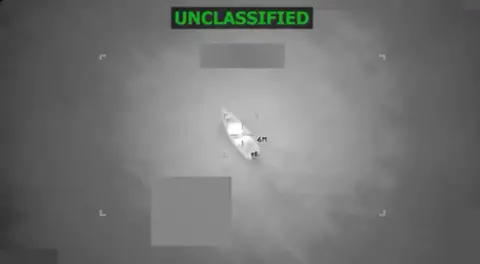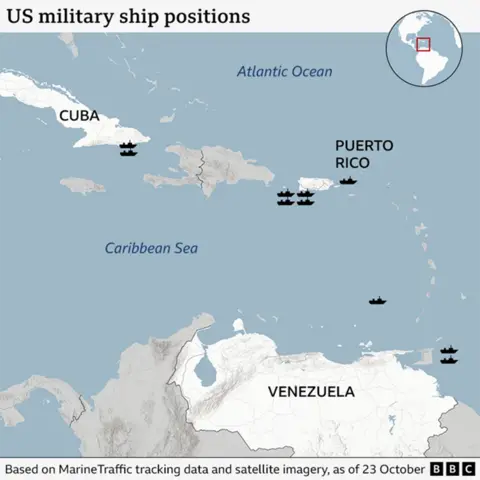Kayla Epstein and
Josh Cheetham,BBC Verify
Venezuela’s President Nicolás Maduro has accused the US of “fabricating a new war”, after it ordered the world’s largest warship to be sent to the Caribbean.
The USS Gerald R Ford can carry up to 90 aircraft and its deployment marks a massive increase in US firepower in the region.
The US has conducted 10 air strikes on vessels in the area as part of what it says is a war on drug traffickers.
US President Donald Trump has accused Maduro of being the leader of a drug-trafficking organisation, which he denies, and there are fears in Venezuela that the US military build-up is aimed at removing the long-time opponent of Trump from power.
The US does not recognise Maduro as Venezuela’s legitimate leader, after the last election in 2024 was widely dismissed as neither free nor fair. Opposition tallies from polling stations showed its candidate had won by a landslide.
Venezuela plays a relatively minor role in the region’s drug trade.
The Pentagon said on Friday that the USS Gerald R Ford carrier would deploy to the US Southern Command area of responsibility, which includes Central America and South America, as well as the Caribbean.
The additional forces “will enhance and augment existing capabilities to disrupt narcotics trafficking and degrade and dismantle transnational criminal organisations”, spokesman Sean Parnell said.
Maduro accused the US of seeking “a new eternal war” in his address.
“They promised they would never again get involved in a war, and they are fabricating a war,” he told state media.
The carrier’s deployment would provide the resources to start conducting strikes against targets on the ground.
Trump has repeatedly raised the possibility of what he called “land action” in Venezuela.
“We are certainly looking at land now, because we’ve got the sea very well under control,” he said earlier this week.
The US has also bolstered its air presence in the region. BBC Verify has identified a number of US military aircraft across Puerto Rico.
It comes as CNN reports Trump is considering targeting cocaine facilities and drug trafficking routes inside Venezuela, but is yet to make a final decision.
Military analysts have pointed out that intercepting drugs at sea does not require a force as big as the current US one.
On Friday, US Defence Secretary Pete Hegseth said “six male narco-terrorists” had been killed in an operation in the Caribbean.
He said the boat had belonged to the Tren de Aragua – a transnational criminal organisation which has its base in Venezuela and has been proscribed as a terrorist group by the US State Department.
The US air strikes have drawn condemnation in the region and experts have questioned their legality.
“This is about regime change. They’re probably not going to invade, the hope is this is about signalling,” Dr Christopher Sabatini, a senior fellow for Latin America at the Chatham House think tank, told the BBC.
He argued the military build-up was intended to “strike fear” into the hearts of the Venezuelan military and Maduro’s inner circle so that they move against him.
 Pete Hegseth on X
Pete Hegseth on XThe strike was the latest the Trump administration has carried out against alleged drug traffickers since early September. Most have taken place off the coast of South America, in the Caribbean, but on 21 and 22 October it carried out strikes in the Pacific Ocean as well.
At least 43 people have been killed.
Members of US Congress, both Democrats and Republicans, have raised concerns about the legality of the strikes and the president’s authority to order them.
On 10 September, 25 Democratic senators wrote to the White House, alleging the administration had struck a vessel days earlier “without evidence that the individuals on the vessel and the vessel’s cargo posed a threat to the United States”.
Senator Rand Paul of Kentucky, a Republican, has argued that such strikes require congressional approval. Trump has said he has the legal authority to order the strikes.
“We’re allowed to do that, and if we do [it] by land, we may go back to Congress,” Trump told White House reporters on Wednesday.
Brian Finucane, a former US State Department lawyer, told the BBC that the situation amounted to a constitutional crisis that the US Congress, controlled by Republicans, has appeared unwilling to challenge.
“It is the US Congress that has principal control over the use of military force. That control has been usurped in this instance by the White House, and so it’s up to Congress to push back,” said Mr Finucane, who now works at the International Crisis Group.

